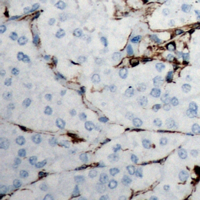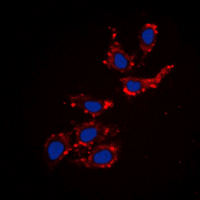Anti-Collagen 18 alpha 1 Antibody
- SPECIFICATION
- CITATIONS: 1
- PROTOCOLS
- BACKGROUND

Application
| WB, IF, IHC |
|---|---|
| Primary Accession | P39060 |
| Reactivity | Human |
| Host | Rabbit |
| Clonality | Polyclonal |
| Calculated MW | 178188 Da |
| Gene ID | 80781 |
|---|---|
| Other Names | Collagen alpha-1(XVIII) chain |
| Target/Specificity | KLH-conjugated synthetic peptide encompassing a sequence within the center region of human Collagen 18 alpha 1. The exact sequence is proprietary. |
| Dilution | WB~~1/500 - 1/1000 IF~~1/50 - 1/200 IHC~~1:100~500 |
| Format | Liquid in 0.42% Potassium phosphate, 0.87% Sodium chloride, pH 7.3, 30% glycerol, and 0.09% (W/V) sodium azide. |
| Storage | Store at -20 °C.Stable for 12 months from date of receipt |
| Name | COL18A1 (HGNC:2195) |
|---|---|
| Function | Probably plays a major role in determining the retinal structure as well as in the closure of the neural tube. |
| Cellular Location | Secreted, extracellular space, extracellular matrix. Secreted, extracellular space, extracellular matrix, basement membrane {ECO:0000250|UniProtKB:P39061} [Endostatin]: Secreted. Secreted, extracellular space, extracellular matrix, basement membrane |
| Tissue Location | Detected in placenta (at protein level) (PubMed:32337544). Present in multiple organs with highest levels in liver, lung and kidney. |

Provided below are standard protocols that you may find useful for product applications.
Background
Rabbit polyclonal antibody to Collagen 18 alpha 1
If you have used an Abcepta product and would like to share how it has performed, please click on the "Submit Review" button and provide the requested information. Our staff will examine and post your review and contact you if needed.
If you have any additional inquiries please email technical services at tech@abcepta.com.














 Foundational characteristics of cancer include proliferation, angiogenesis, migration, evasion of apoptosis, and cellular immortality. Find key markers for these cellular processes and antibodies to detect them.
Foundational characteristics of cancer include proliferation, angiogenesis, migration, evasion of apoptosis, and cellular immortality. Find key markers for these cellular processes and antibodies to detect them. The SUMOplot™ Analysis Program predicts and scores sumoylation sites in your protein. SUMOylation is a post-translational modification involved in various cellular processes, such as nuclear-cytosolic transport, transcriptional regulation, apoptosis, protein stability, response to stress, and progression through the cell cycle.
The SUMOplot™ Analysis Program predicts and scores sumoylation sites in your protein. SUMOylation is a post-translational modification involved in various cellular processes, such as nuclear-cytosolic transport, transcriptional regulation, apoptosis, protein stability, response to stress, and progression through the cell cycle. The Autophagy Receptor Motif Plotter predicts and scores autophagy receptor binding sites in your protein. Identifying proteins connected to this pathway is critical to understanding the role of autophagy in physiological as well as pathological processes such as development, differentiation, neurodegenerative diseases, stress, infection, and cancer.
The Autophagy Receptor Motif Plotter predicts and scores autophagy receptor binding sites in your protein. Identifying proteins connected to this pathway is critical to understanding the role of autophagy in physiological as well as pathological processes such as development, differentiation, neurodegenerative diseases, stress, infection, and cancer.



